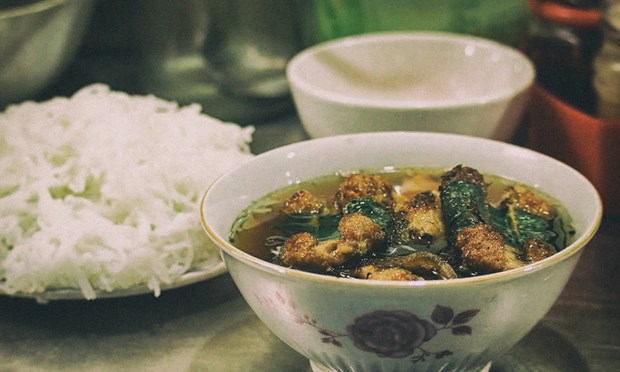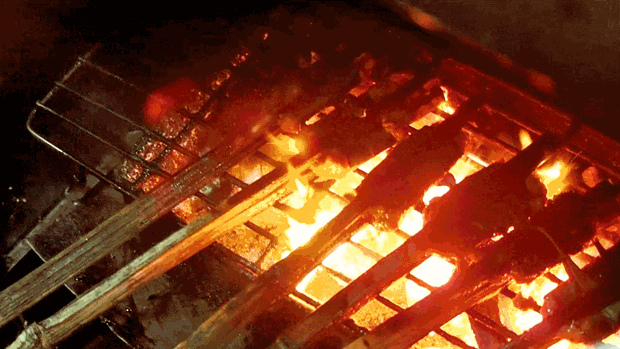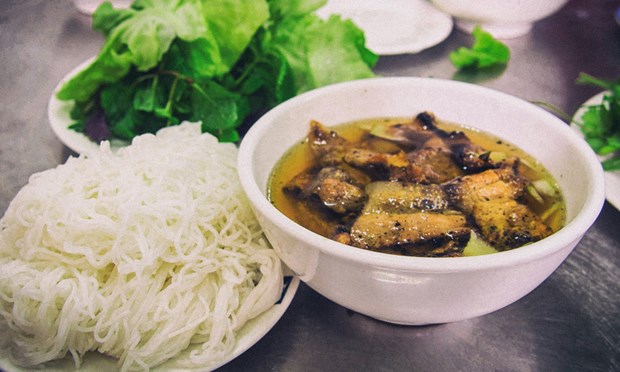In
1960, Vu Bang dedicated an entire chapter of Hanoi Delicacies to the town’s
special relationship with bun (pronounced “boon!”) a noodle the world at-large
likely knew nothing about.
“This
is one dish that truly belongs to Hanoi,” he wrote in his seminal book on
cuisine in the capital. “I can't imagine a single Vietnamese has ever passed
up, much less disliked, a meal based in bun.”
The
oft-employed translation “rice vermicelli” fails to impart the versatility of
this dynamic noodle which you may find swimming in snail soup, holding together
spring rolls or hiding (semi-fermented) below piles of grilled meat and herbs.
At
one point, wise Hanoi cooks chopped Tet leftovers into an attractive mélange
for a final feast they called bun thang.
Bun
is all things to all people in Vietnam, but the world knows it best as bun cha.
In
the early 20th century, Bang tells us peddlers from Hanoi’s outskirts dragged
shoulder poles into the Old Quarter to set up portable barbeque stands.
Vu
Bang said the aroma of pork grilling over tiny charcoal fires rapped at every
door in the neighborhood, drawing men out into the street to squat around the
vendors awaiting piles of bun quivering on banana leaves accompanied by
lettuce, cilantro and most importantly: a bowl of grilled pork (cha in this
instance) swimming in fish sauce.
In
the myriad efforts to draw the men home, home cooks produced failure piles of
pink meatballs and charred belly slices. To save face, some generated rumors
that the street cooks were sneakily insulating the pork with dog fat.
After
tireless taste tests, Bang concluded that the trick lay in slow-grilling the
meat between thin bamboo sticks over small charcoal fires fanned in tin biscuit
boxes.
Bang
frequented a spot in an alley off Dong Xuan market that still draws bun cha
junkies today. But the dish remains remarkable only insofar as they serve their
meat with fresh chapa leaves - a rare herb once believed to assuage bronchitis
and asthma.

Bun cha with chapa leaves.
“There
isn't an outstanding bun cha stall in Hanoi,” Bang concluded back in the 60’s.
“Not because they aren’t doing a great job, but indeed because everyone is
nearly equally good.”
For
Bang, it was all about the method.
Chef
Nguyen Phuong Hai, an expert on traditional Hanoi cuisine, confirmed that the
technique Bang describes once reigned in the capital.
“You
take cha off the bamboo sticks, toss it in the sauce and start eating,” he
said. “A nice bun cha must be rich with the smell of pork, fish sauce, spring
onions and pepper. The bowl must not be too big, cha must not smell smoky.”

Grilling cha with bamboo sticks.
But
time and demand have replaced the finicky process with charcoal fires
super-charged by electric fans and tended by teenagers who flip their way
through stacks of metal screens stuffed with as much meat as possible.
Once
finished, they often unceremoniously dump the finished product into a waiting
bowl of blended fish sauce.
“Our
stall is jammed from 11 a.m. to 2 p.m., we can’t keep our guests waiting with
those bamboo sticks,” said Tuyet, the owner of a popular 30-year-old stall on
Hang Than street.
The
bun cha business is, indeed, booming.
Since
a brief and seemingly life-changing visit from U.S. President Barack Obama, Bun
Cha Huong Lien has expanded its business hours to accommodate throngs of
customers hoping to dig into American-sized portions of meat—or simply
photograph themselves standing next to the blue plastic stool once graced by
the first derriere.

Bun Cha Huong Lien.
The
capital remains divided about whether the Huong Lien merits the hype. Most just
patronize the one closest to home.
Bang
wrote his chapter on bun cha as a nostalgic spy trapped in Saigon and so he
might find it ironic that a Hanoi family maintains his favorite grill technique
in alley 173 of Nguyen Thi Minh Khai in Ho Chi Minh City’s District 1.
Now
in their second generation of ownership, every order at Bun Cha Gio Hanoi gets
meticulously grilled between sticks of bamboo just after you order it.
Writer: Quynh Trang
By VnExpress